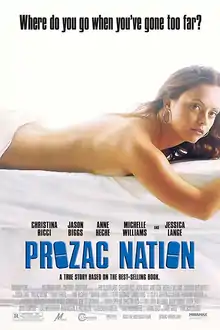| Prozac Nation | |
|---|---|
 Promotional poster | |
| Directed by | Erik Skjoldbjærg |
| Screenplay by | |
| Adaptation by | Galt Niederhoffer |
| Based on | Prozac Nation by Elizabeth Wurtzel |
| Produced by |
|
| Starring | |
| Cinematography | Erling Thurmann-Andersen |
| Edited by | James Lyons |
| Music by | Nathan Larson |
Production companies |
|
| Distributed by | Miramax Films |
Release dates |
|
Running time | 95 minutes |
| Countries |
|
| Language | English |
| Budget | $9 million[1] |
| Box office | $129,364[2] |
Prozac Nation is a 2001 psychological drama film directed by Erik Skjoldbjærg, starring Christina Ricci, Jason Biggs, Anne Heche, Michelle Williams, Jonathan Rhys Meyers, and Jessica Lange. It is based on Elizabeth Wurtzel's 1994 memoir of the same name, which describes Wurtzel's experiences with atypical depression.[3] The title is a reference to Prozac, the brand name of an antidepressant she was prescribed.
Plot
Elizabeth "Lizzie" Wurtzel is a 19-year-old accepted into Harvard with a scholarship in journalism. She has been raised by her divorced mother since she was two years old and has not seen her father at all in the last four years. Despite his lack of interest and involvement, Lizzie still misses her father, a contributing factor to her depression. Through a series of flashbacks, it is clear that there was a total communication breakdown between Lizzie's parents, which is soon reflected in Lizzie's own relationship with her mother.
Soon after arriving at Harvard, Lizzie decides to lose her virginity to an older student, Noah. Lizzie proceeds to alienate Noah by throwing a loss-of-virginity party immediately afterwards with the help of her roommate Ruby. Although she and Lizzie begin as best friends, Ruby soon becomes another casualty of Lizzie's instability. Although Lizzie's article for the local music column in The Harvard Crimson is presented an award by Rolling Stone early into the semester, Lizzie soon finds herself unable to write, stuck in a vicious cycle with substance abuse. She begins a relationship with another student, Rafe, and visits his home in Texas. Upon discovering that his sister is severely autistic, Lizzie accuses Rafe of being 'a creepy voyeur' who gets off on witnessing the pain of others. Rafe breaks up with her.
Lizzie's promising literary career is at risk, as is her mental and physical health. Her mother sends her to expensive psychiatric sessions towards which her father, pleading poverty, implacably refuses to contribute anything at all. After a long period of treatment under medication and a suicidal gesture, Lizzie stabilizes and begins to adjust to her life.
Cast
- Christina Ricci as Elizabeth Wurtzel
- Zoe Miller as young Elizabeth Wurtzel
- Jason Biggs as Rafe
- Anne Heche as Dr. Sterling
- Michelle Williams as Ruby
- Jonathan Rhys Meyers as Noah
- Jessica Lange as Lynne Wurtzel
- Jesse Moss as Sam
- Nicholas Campbell as Donald Wurtzel, Elizabeth's father
- Lou Reed as himself
Release
Prozac Nation had its world premiere at the Toronto International Film Festival on September 8, 2001 (three days before the September 11 attacks); distribution rights were acquired by Miramax Films with the intent of giving the film a wider theatrical release. Months of subsequent test screenings and re-edits of the film never led to a broad commercial release.[1] It was released in Norway, Skjoldbjærg's native country, on August 22, 2003. The film was never given a theatrical release in the United States, where it instead premiered on the Starz! channel on March 19, 2005,[4][5] and was released on DVD on July 5, 2005.[6]
Frank Deasy, who co-wrote the screenplay, offered his opinion to The Guardian on Miramax's failure to release the film:
It's a truthful depiction of depression. And I think the reason Miramax has struggled is the fact that it doesn't have a traditional dramatic structure, in terms of a clear, unqualified ending. Look at the book: Elizabeth is very clear that Prozac has helped her, but you're left with a dilemma, because perhaps she no longer knows who she is. We didn't want to come down heavily on one side or the other. People who've experienced depression like that aspect of the film, but a lot of people don't like it. Miramax certainly don't seem to like it.[7]
Reception
The film received generally negative reviews, scoring a 29% on the film aggregate site Rotten Tomatoes.[8]
Soundtrack
What follows is a list of the songs that were played according to the end credits.
- "The Promise" – Bruce Springsteen
- "Mystery Achievement" – The Pretenders
- "I Will Dare" – The Replacements
- "Perfect Day" – Lou Reed
- "Sweet Jane" – Lou Reed
- "Keep the Promise" – The Pontiac Brothers
- "Ivory Tower" – The Long Ryders
- "Who Is Who" – Adolescents
- "The Real West" – Thin White Rope
- "Das Testament des Dr. Mabuse" – Propaganda
References
- 1 2 Vinciguerra, Thomas (9 November 2003). "For Author of 'Prozac Nation,' Delayed Film Is a Downer". The New York Times. Retrieved 8 March 2013.
- ↑ "Prozac Nation (2001)". Box Office Mojo. Retrieved October 18, 2021.
- ↑ Wurtzel, Elizabeth (1994). Prozac Nation: Young and Depressed in America. New York: Riverhead Trade. p. 298. ISBN 978-0-39-568093-3.
The McLean people have recommended fluoxetine because they have diagnosed me with atypical depression.
- ↑ Dempsey, John; Martin, Denise (February 7, 2005). "Starz! prescribes 'Prozac' for pay TV". Variety. Retrieved October 18, 2021.
- ↑ Lloyd, Robert (March 19, 2005). "A true story, in a kinda, sorta way". Los Angeles Times. Retrieved October 18, 2021.
- ↑ Beierle, Aaron (June 28, 2005). "Prozac Nation". DVD Talk. Retrieved October 18, 2021.
- ↑ Harris, John (July 18, 2004). "Release me". The Guardian. Retrieved March 8, 2013.
- ↑ "Prozac Nation (2001)". Rotten Tomatoes.